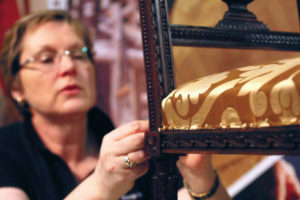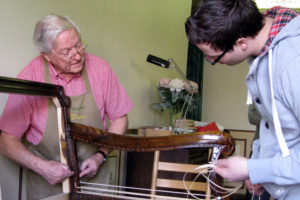Three of the best heritage craftspeople from across the UK have been awarded MBEs in the New Year Honours List 2020, in recognition of their unparalleled craftsmanship and tireless work in ensuring their skills are passed on to current and future generations.
The three were nominated by the Heritage Crafts Association in this year’s New Year Honours, following 16 previously successful nominations since 2013. Earlier this year, the charitable organisation – which was set up ten years ago to support and champion traditional craft skills – published the latest edition of its groundbreaking HCA Red List of Endangered Crafts, the first report of its kind to rank endangered craft skills by the likelihood they will survive into the next generation.
The three recipients of the MBE are:
 David A Smith MBE, for services to reverse glass ornamental artistry – David, from Torquay in Devon, is world-renowned for his high quality reverse glass lettering and artistry – which encompasses all the skills historically done by an array of craftspeople, including design, lettering, acid etching, brilliant cutting, silvering and angel gilding – having revived many of these skills from the point of extinction in the UK. He has had many high-profile commissions in the UK and abroad, including John Meyer, Sony Music, the Victoria & Albert Museum and Disney.
David A Smith MBE, for services to reverse glass ornamental artistry – David, from Torquay in Devon, is world-renowned for his high quality reverse glass lettering and artistry – which encompasses all the skills historically done by an array of craftspeople, including design, lettering, acid etching, brilliant cutting, silvering and angel gilding – having revived many of these skills from the point of extinction in the UK. He has had many high-profile commissions in the UK and abroad, including John Meyer, Sony Music, the Victoria & Albert Museum and Disney. Wendy Shorter-Blake MBE, for services to upholstery – Wendy, from Welwyn Garden City in Hertfordshire, is not only a highly skilled craftswoman herself but she has devoted her life to ensuring that the skills of upholstery are passed on. Over the last 13 years she has set up a multi-award winning training centre providing the very best possible standards of teaching based on her meticulous research of traditional techniques and the history of furniture. Wendy has also worked closely with the charity Fine Cell Work which offers craft training within prison and ongoing support and training for ex-offenders. In 2020 she will become the third female Master of the Worshipful Company of Upholders.
Wendy Shorter-Blake MBE, for services to upholstery – Wendy, from Welwyn Garden City in Hertfordshire, is not only a highly skilled craftswoman herself but she has devoted her life to ensuring that the skills of upholstery are passed on. Over the last 13 years she has set up a multi-award winning training centre providing the very best possible standards of teaching based on her meticulous research of traditional techniques and the history of furniture. Wendy has also worked closely with the charity Fine Cell Work which offers craft training within prison and ongoing support and training for ex-offenders. In 2020 she will become the third female Master of the Worshipful Company of Upholders. Brian Crossley MBE, for services to chair caning – Brian, from Tattenhall in Cheshire, has been involved in the endangered craft of chair caning for over 50 years – initially in his spare time, and now full time – having been taught by his mother. He has devoted himself to perfecting and passing on the skills, and is now one of the most revered practitioners in the world, regarded as an expert and ambassador in his field. Brian’s previous career was in civil engineering, and he has provided decades of mentoring and developing others through the Institution of Civil Engineers. He has also been awarded an honorary doctorate by the University of Bolton for his outstanding contribution to the field of construction.
Brian Crossley MBE, for services to chair caning – Brian, from Tattenhall in Cheshire, has been involved in the endangered craft of chair caning for over 50 years – initially in his spare time, and now full time – having been taught by his mother. He has devoted himself to perfecting and passing on the skills, and is now one of the most revered practitioners in the world, regarded as an expert and ambassador in his field. Brian’s previous career was in civil engineering, and he has provided decades of mentoring and developing others through the Institution of Civil Engineers. He has also been awarded an honorary doctorate by the University of Bolton for his outstanding contribution to the field of construction.
HCA Chair Patricia Lovett MBE said:
“While countries like Japan and Korea have National Living Treasures schemes to celebrate master craftspeople, the UK as yet has no equivalent way of recognising our most highly skilled makers – and is one of only 15 of the 193 UNESCO member states yet to ratify the 2003 Convention on the Safeguarding of Intangible Heritage. We are delighted therefore that these talented individuals, who give so much of themselves to ensure that their crafts continue, have been recognised through the honours system, putting traditional craftspeople up there with other great luminaries of public life.”
The HCA encourages anyone who supports the continuation of traditional craft skills, whether or not they are makers themselves, to become HCA members. It has set up an Endangered Crafts Fund to provide small grants to projects that increase the likelihood of endangered craft skills surviving into the next generation, and is currently seeking donations to save more of Britain’s most endangered crafts from oblivion – www.heritagecrafts.org.uk/ecf.
Press releases:
- Three MBEs awarded to heritage craftspeople
- MBE for Torquay glass sign artist David A Smith
- MBE for Hertfordshire upholsterer Wendy Shorter-Blake
- MBE for Cheshire chair caner Brian Crossley
More details about each recipient
David A Smith MBE, for services to reverse glass ornamental artistry
David, from Torquay in Devon, is world-renowned for his high quality reverse glass lettering and artistry – which encompasses all the skills historically done by an array of craftspeople, including design, lettering, acid etching, brilliant cutting, silvering and angel gilding – having revived many of these skills from the point of extinction in the UK. He has had many high-profile commissions in the UK and abroad, including John Meyer, Sony Music, the Victoria & Albert Museum and Disney.
David has taught over 800 students (500 from abroad) and is the only practitioner able to teach such a broad range of skills, hence his craft being categorised as critically endangered in the HCA Red List of Endangered Crafts. Many hundreds of students have been able to benefit directly from the classes he teaches, both in his studio and in other countries. Many thousands more benefit from his regular online presence, where he shows examples of his work in process and gives pointers, advice and, most of all, provides encouragement to students and design enthusiasts worldwide.
David’s knowledge is extensive, and yet he still seeks out obscure processes from days gone by to enrich his craft and pass the information on to others, inspiring a new generation to the value of craftsmanship and artistry.
Wendy Shorter-Blake MBE, for services to upholstery
Wendy, from Welwyn Garden City in Hertfordshire, is not only a highly skilled craftswoman herself but she has devoted her life to ensuring that the skills of upholstery are passed on. Over the last 13 years she has set up a multi-award winning training centre providing the very best possible standards of teaching based on her meticulous research of traditional techniques and the history of furniture.
Wendy was appointed Director of Training (a voluntary position) for the Association of Master Upholsterers and Soft Furnishers (AMUSF) in 2008, putting her at the forefront of training provision and development of the Association’s qualification standards. In the last three years she has developed those standards into the current Diploma course, thus ensuring that hundreds of students can attain the highest level of qualification in the craft. She promoted a schools programme where sixth-formers from local schools were given the opportunity to train for an upholstery qualification, and personally sponsored one school leaver for more advanced training.
Wendy has also worked closely with the charity Fine Cell Work which offers craft training within prison and ongoing support and training for ex-offenders. In 2020 she will become the third female Master of the Worshipful Company of Upholders.
Brian Crossley MBE, for services to chair caning
Brian, from Tattenhall in Cheshire, has been involved in the endangered craft of chair caning for over 50 years – initially in his spare time, and now full time – having been taught by his mother. He has devoted himself to perfecting and passing on the skills, and is now one of the most revered practitioners in the world, regarded as an expert and ambassador in his field. He is the go-to craftsman for prestigious museums and antique collectors to repair and re-cane their furniture, including the Ruskin Museum where he re-caned John Ruskin’s very own high chair.
Brian was a founder Trustee of the Heritage Crafts Association nine years ago, and its first Secretary, setting up the Association such that it had sound governance and a solid foundation for the future. He is a strong advocate for craft, being a great ambassador for both chair caning and heritage crafts in general. His unique skills as a maker, teacher and researcher have been recognised by the Worshipful Company of Basketmakers, of which he is a Yeoman.
Brian’s previous career was in civil engineering, and he has provided decades of mentoring and developing others through the Institution of Civil Engineers. He rose from Chair of a regional committee to eventually Vice President of the Institution for four years, responsible for standards of civil engineering in many countries. From 2002 to 2013 he volunteered for the Historical Engineering Group, researching and preserving unique past engineering works. In 2001 he won the Garth Watson medal, the highest award for service to the Institute. He has also been awarded an honorary doctorate by the University of Bolton for his outstanding contribution to the field of construction.



